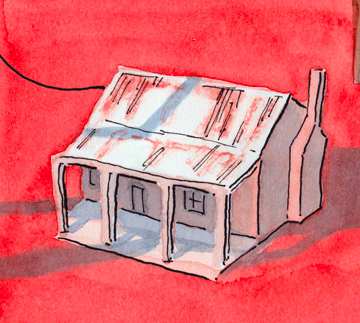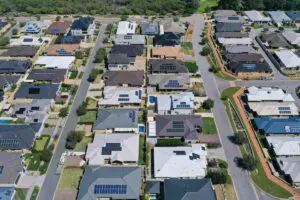Last year, a CSIRO study confirmed that up to one-third of all consumers may wish to quit the grid altogether if presented with the right technology, and they get tired of the way they are treated by the grid-based utilities.
Many downplay the idea, describing such decisions as “irrational” and “uneconomic”, and seek to convince consumers to stay on the grid, sometimes with scare campaigns about the cost of leaving. One utility, however, has decided to address the issue in a different way, and published a 10-step guide for consumers considering the idea.

Ergon Energy doubles as the main network operator and retailer in Queensland – apart from the south-east corner – and because it services regional and sometimes remote areas, is likely to be at the forefront of the move to quit the grid. In fact, it predicted as much in its annual report several years ago.
“With reducing costs for solar PV/battery systems and a rise in off-grid enabled products on the market, many more people are considering making the switch,” the company notes in its newly posted off-grid briefing for consumers.
“We’re here to support you in any decision you make about your energy future. So, if you’re thinking of going off-grid one day, we want to ensure you’re well informed before you spend any money.”
The principal author of the report, Dean Comber, Ergon’s product manager for customer inverter systems, says it is about providing consumers with “choice and control”, and this involves solar PV, battery storage and home energy management systems.
“We appreciate there is a small and growing number of customers who wish to exercise choice and control by buying and managing their own electricity generation and storage system and disconnecting their premises from the grid,” Comber told RenewEconomy in an emailed statement.
“Based on our insights from our research, the media, and informal discussions with customers and intermediaries such as the PV and storage industry, we want to ensure aspiring grid-disconnectors have an understanding of the realities of living with a stand-alone system.
“As you know, once they buy their Tesla or other battery system, disconnecting from the grid may seem an easy next step, in theory, but it’s not the same for every customer and there are many technical or cost differences between grid-connected and stand-alone battery systems.”
The Ergon approach is a softer one than that adopted by the main networks lobby, which last year published assessments that put the cost at disconnecting at around $72,000 a home. That may be the case for some, but not for all.
Comber, in an email to colleagues in other networks a few weeks ago, said Ergon was seeking to highlight the realities of leaving the grid, “without looking like a big corporate entity trying to scare customers into staying with us.”
In his statement to RenewEconomy, Comber says that Ergon recognises that a “positive outcome” is certainly possible for those “grid-disconnectors” who have energy-efficient homes and lifestyles, who are willing and able to maintain their stand-alone systems, and who are prepared to make lifestyle adjustments if necessary to live within their energy means.
“We also know that some may simply be prepared to make more significant investments in larger systems to meet their energy use patterns.”
The key motivation, he says, is to minimise bad outcomes for customers who want to disconnect, but find that it is not such a great idea for them. Those bad outcomes include having oversized systems, still facing standing charges, or just finding the whole experience terribly inconvenient.
The issue about leaving the grid is particularly important because so many consumers are looking to battery storage, particularly with feed-in tariffs low and many in some states losing the premium tariffs that they have enjoyed in recent years.
But, installers note, there is a large degree of misunderstanding about what battery storage can achieve, and what different technologies are best applied for households depending on their need.
Others suggest that consumers may jot be getting good advice because of the sales-driven process of some vendors. And there are also concerns about quality and safety standards.
“Early feedback on our new web page about going off-grid is that many people have had their eyes opened to the challenges of living off the grid,” Ergon says.
“We also hope that the PV industry will view this web page as a resource to help educate their potential customers and manage their potentially unrealistic expectations before investing time that may prove to be wasted.”
So, what are the ten things that consumers should think about before going off grid? Here is a summary:
1. Payback on your investment
To determine your payback period on a solar PV/battery system, here are some things you should consider:
- The purchase price
- Solar panel capacity required
- Usable battery capacity required
- System maintenance costs
- The loss of an existing feed-in tariff
- The future price of electricity (will it go up or down, and by how much?)
- Your electricity usage – both your daily peak demand and your total use in an average week.
You should also consider if you’ll stay in your home long enough to recover your costs. Discuss your ideas with a number of solar PV/battery suppliers to see what options they suggest.
2. Roof space for solar panels
Considering your daily electricity use, is there enough of your roof in the sun for the amount of panels you’ll need? If you don’t have enough roof space, you may need to mount panels on your shed or even on the ground. This could come with further set-up costs.
3. Back-up power generation
Having an off-grid electricity system means thinking about the right size generation and storage to get you through your peak daily needs. Also through any time there is a run of cloudy days. Your solar PV/battery system won’t supply power if:
- The battery has been fully used at night-time and needs charging
- There is a system fault or breakage
- It is undergoing scheduled maintenance.
If you can’t do without power at those times, you’ll need a back-up generator to meet your basic electricity needs. A generator must be housed somewhere safe with appropriate ventilation and not cause a disturbance (eg. noise and smell). Generators will run best when maintained regularly and refuelled. Read more about generator safety and use
4. Spikes in your power use
Your electricity use varies greatly within a day, with regular high spikes of demand for very short times. Air conditioners and pool pumps can create short bursts of high demand when starting, often only lasting a few seconds.
An off-grid system’s inverter must be able to supply this high start-up power or the appliance may not start properly. This demand is additional to other electricity loads running at the same time, for example the TV, fridge, computer, etc.
If your inverter cannot supply these high spikes in demand, you may have to give up some non-essential appliances, or use them less and more carefully. Otherwise, you may have to install a larger system at a higher cost.
5. Lifestyle changes
Going off-grid usually requires some lifestyle changes, depending on the type of appliances you have and your electricity demand.
Energy saving habits and energy efficient appliances will help to prevent your system cutting out or not having enough power to run your home. Also, you can consider the impacts of:
- Having house guests
- A particularly cold winter or hot summer
- Hosting a party.
Would your chosen size of system cope?
6. Battery safety risks
All battery types have risks including explosion, fire and chemical leakage. To keep you, your family and your neighbours safe, ensure your batteries are:
- Installed correctly
- Stored safely (think of closeness to living spaces, exit paths and potential damage to your home and car)
- Regularly maintained.
There are regulations governing the housing of batteries that could add to your purchase costs. Read more on our battery safety webpage and the Clean Energy Council website.
7. Ongoing costs
Solar panels generally have 20 – 25 year performance and operating warranties. Inverters and battery management systems may only have a five or 10 year warranty. This means you’ll probably need to replace inverters and batteries at least once, perhaps twice, during the life of your solar panels.
If your system breaks down, it could be quite costly to fix. And with no electricity supply from the grid, you’ll have to pay for fuel to run your generator.
You may also have to pay someone to clean your panels, check your system (ideally annually) and service your generator.
8. System maintenance
When you go off the grid, maintaining your power supply becomes your responsibility. Regular services by an electrical professional are essential.
Minor issues could be inconvenient or possibly result in you using your back-up generator for quite some time. It depends on the level of system support, so some important questions for a potential supplier or installer include:
- How is the product supported?
- Is there someone to call early in the morning or at night for assistance?
- How long might it take spares to come, considering they may need to come from another country?
9. Charging an electric vehicle
If you have an electric vehicle (EV) or are considering buying one, charging it creates a high electricity demand. Meeting that extra demand may add a lot to your solar PV/battery set-up costs and the roof space required for panels. The average EV draws around 18kWh of charge to travel 100km*.
10. Your property value
An off-grid home may draw in some potential buyers and deter others, so if going off-grid is appealing to you, consider the following:
- The potential buying pool could be smaller when you come to sell your home
- Even if a buyer is prepared to pay more for an off-grid house, that amount may be less than the total amount of the payback you expected
- As well, check with your home insurer to ensure your home remains suitably insured.
Also, it’s a good idea to check any local council restrictions or estate covenants. These can include restrictions on solar panels on the front of houses, where the batteries are housed and the use of petrol/diesel generators – particularly at night given the potential noise levels.







